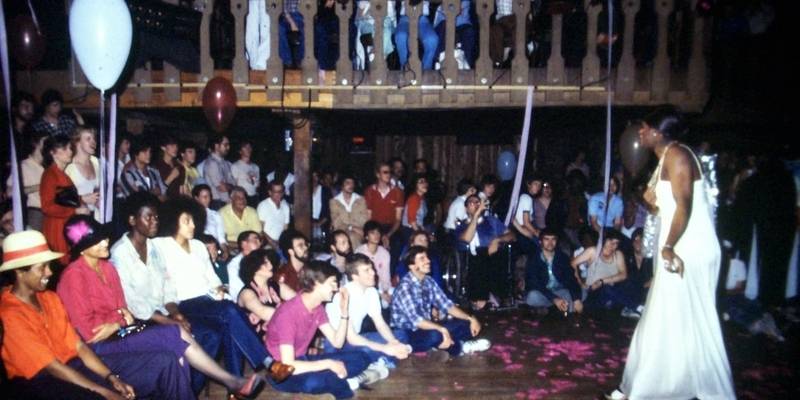“Not many people will remember the first actual ‘gay bar’ in C-U,” says Doug Barnes, who grew up in nearby Danville. Barnes and several good friends would load up in a car and make the trek to Champaign as often as once a week. “It was actually the lounge at the Inman Hotel,” Barnes continued. “I remember sneaking in when I was still in high school, sitting in the corner, listening to the juke box, watching everyone, and having a great time. It was a new experience in my life. Meeting other gays and just the excitement and feeling of being able to be myself around everyone, I had been out most of my life, but being in that space was the beginning of a whole new life.”
Barnes went on to attend Illinois State University in Normal, IL and visited bars like the Male Box in Peoria, where he met Joe McNamara. McNamara was the manager of a little bar called Giovanni’s Place that opened in Champaign in 1975 and catered to the gay community. Having a live DJ instead of just a jukebox was all the new rage at bars and clubs as the disco era began to take hold and McNamara was looking for a DJ. Barnes took a shot at the job, having never been a DJ before, and found a new vocation and community.
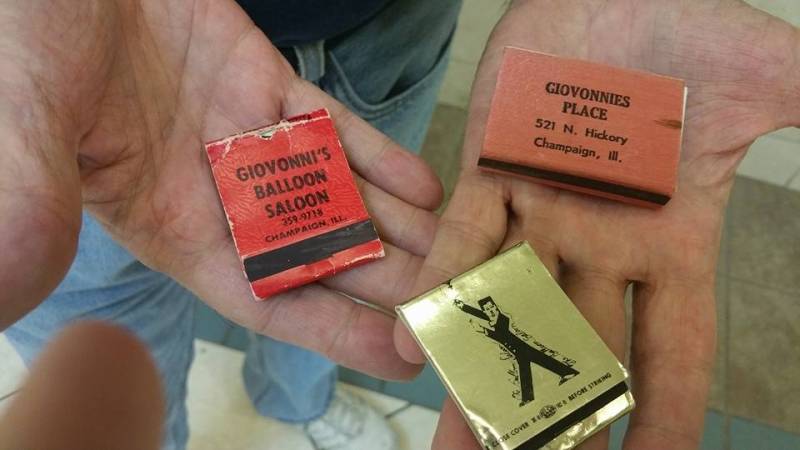
McNamara laughs warmly about the lounge at the Inman, called the Crystal Room, being the first ‘gay bar’. McNamara, now a resident of Palm Springs, Florida, remembers the Crystal Room, but says it wasn’t the first ‘gay bar.’ The Wig Wam on 6th Street in the campus district was a hot spot for the LGBTQ community in the 60s long before the Crystal Room, and before that was the Capitol Restaurant (now Murphy’s) on Green Street in the 50s and early 60s. “And I am sure there was a spot before that,” continues McNamara.
And yet, despite the history of many other LGBTQ spaces and clubs in C-U, the Chester Street Bar at 63 E. Chester St. has arguably been the most famous and unarguably the longest-run. When the word got out in late June of this year that C-Street, as it’s more commonly known, had been sold by longtime owner Ed Piraino and was, at least temporarily, closed for remodeling with no promise it would return as “C-Street” or host drag nights, social media lit up with reactions. One long-time fan posted to many ‘likes’ on Facebook, “C-Street was THE gay bar of C-U!”
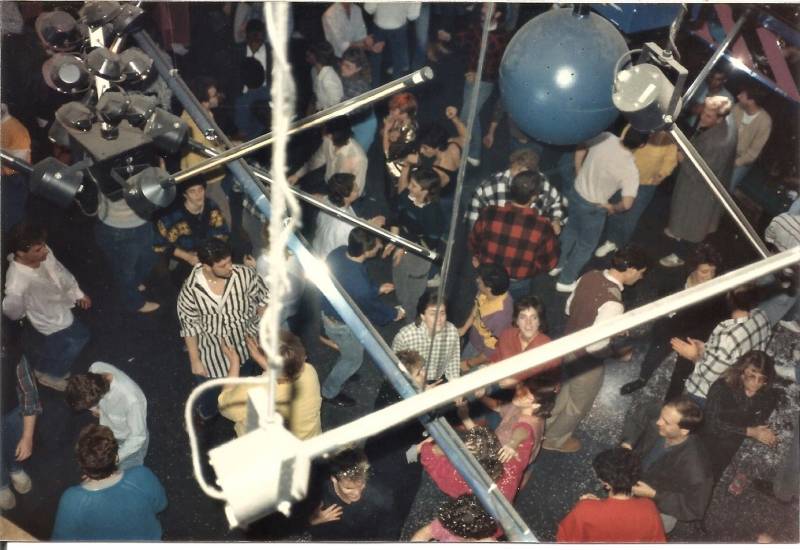
After 34 years of C-Street being a LGBTQ mainstay space in the community, owned by a member of the LGBTQ community, there were a lot of strong feelings about the sale. Stories poured out about the magical times past patrons and staff alike experienced at the space in the 80s, 90s, and 00s. “I remember crying behind the bar (when I heard) and customers asking me if I was okay,” recounts Amy Myers, a long time bartender and emcee of the frequent drag shows at C-Street. “I was angry, I was sad, I was mad. I was feeling all of the emotions.”
“My heart was broken after hearing (C-Street) was closing,” lamented CJ Brown, who was a regular performer at the C-Street drag shows under the stage name Karma B. “Chester Street Bar has always been hailed as ‘the gay space’ of the CU since I can remember. “I got my start as a drag queen on my 19th birthday for one of their open talent nights. My makeup was a mess, my wig was sideways, and my lip sync was awful, but everyone welcomed me with open arms.”
The space at 63 E. Chester St. was a LGBTQ mecca even before Piraino opened it under the name “The Chester Street Bar” in 1983. Before C-Street, there was The Bar. “The name was a play on an old code,” says Jack Wallace, a longtime resident of C-U, who was a regular at the club. “When you said you were going to ‘the bar’ in certain circles they knew it meant you were going to the gay bar.” After managing Giovanni’s for a couple years, which was owned by Piraino, McNamara wanted to open up something of his own for the LGBTQ community, something larger. He got his chance when two things coincided: he got fired from his manager job at Giovanni’s and the same week cops busted an infamous campus bar called Chances R for having their second wet t-shirt contest. Chances R happened to be located at 63 E. Chester St.
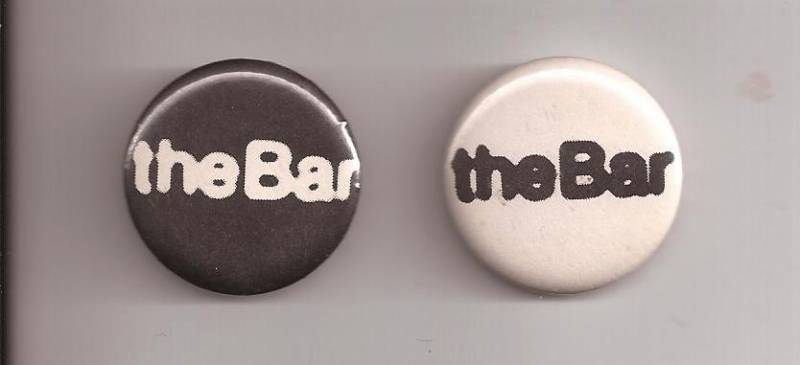
“I’d already been toying with the idea of hosting a disco night at Chances R that welcomed gays and had been talking to the owners about it,” confessed McNamara. “Then I got fired.” McNamara called the owners when he heard the news about the bust, and it turned out they wanted to know if he was interested in buying the bar. McNamara didn’t have the money, but the owners made a deal with him to buy him time. He then advertised for investors nationally.
By the time the investors were found and the paint dried, it was 1978. McNamara was the sole owner, Barnes was the lead DJ, and the doors were ready to open. “It was a circus!” exclaimed Wallace, remembering that night. McNamara concedes that ‘a circus’ was a pretty fair description. “We had entertainers out front doing gymnastics to keep the people in line entertained, we had a marching band out there, we had everything.”
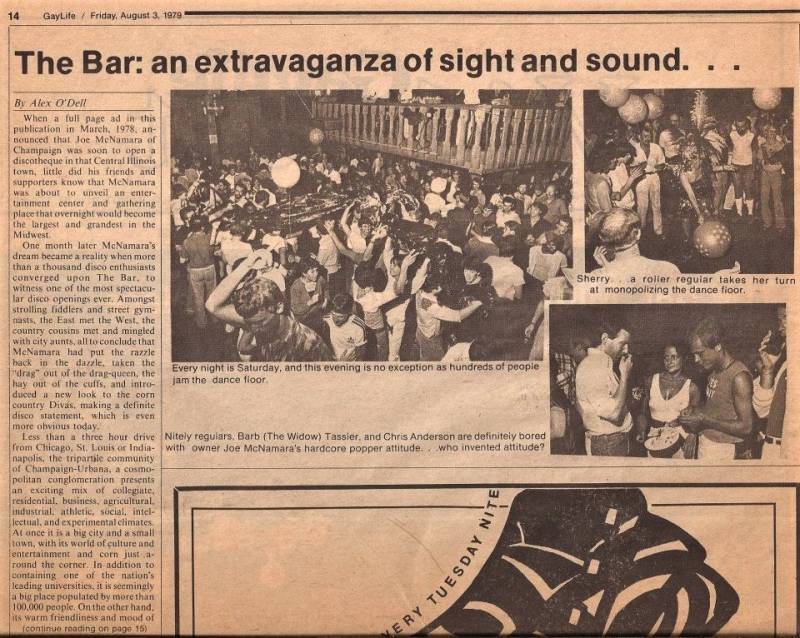
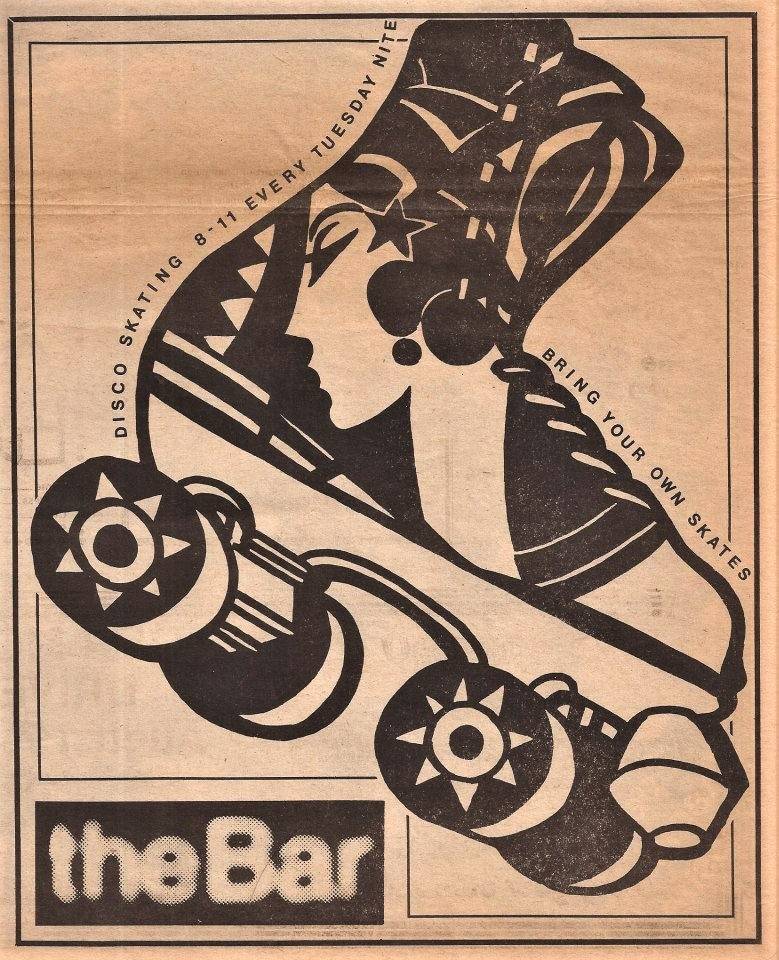
The leading Chicago LGBTQ newspaper of the time dedicated a front page story and a multi-page photo layout to The Bar’s opening and bus loads of people arrived from Chicago, Indianapolis, and St. Louis. “There was a bus called the B.O.M.A., the “Bus of Major Attitude”, and they would pack it full of people in front of a club in Chicago and drive it down to The Bar on the weekends,” remembers McNamara. “Disco was huge and The Bar was the biggest and best place for disco for miles around,” said Barnes.
But by 1983 disco was waning, McNamara felt ready to try new things, and the AIDS crisis was changing the LGBTQ scene everywhere, including C-U. “Strangers came up to me and told me, ‘everyone in your club is going to die and you’re responsible.’ At first it was just called ‘the gay cancer’… they didn’t even know what it was.” While the times were changing, McNamara had half a dozen eager buyers making offers. He chose Piraino because he knew that it would remain a gay bar.
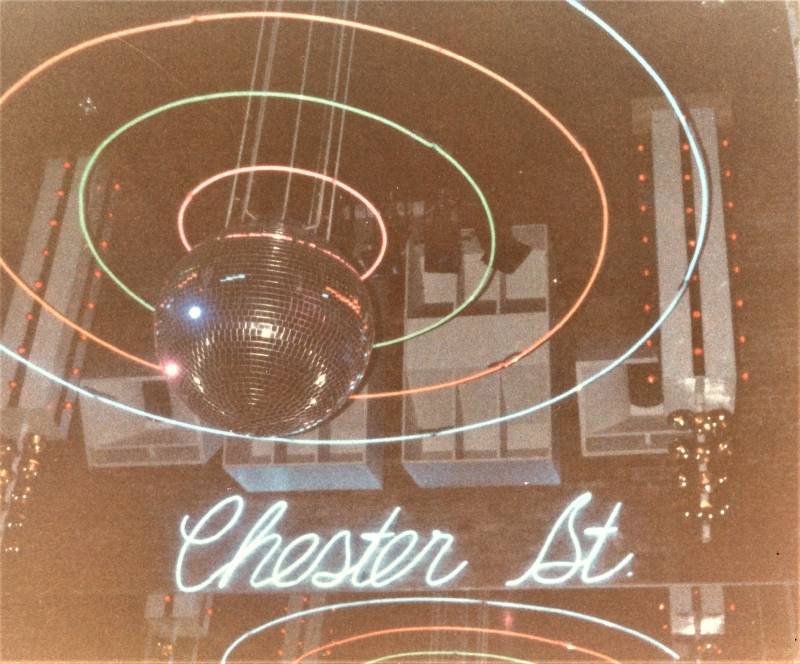
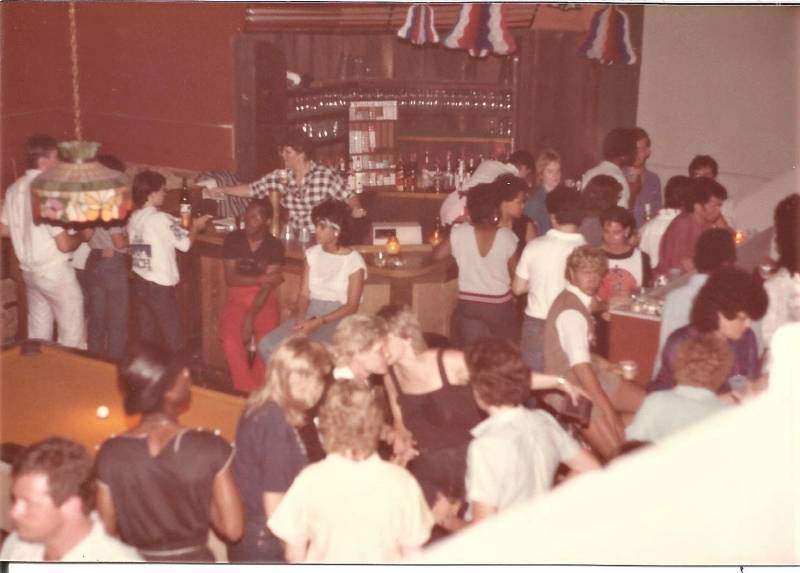
After almost six years as The Bar, the space at 63 E. Chester St. reopened as The Chester Street Bar, or C-Street, under the ownership of Piraino. C-Street continued to be the favorite bar of the LGBTQ community not just in C-U, but in the region. “I moved here the second I got out of high school because of C-Street,” says Myers, who grew up in the small town of Canton, IL. She moved to C-U in 1993 and quickly became a beloved fixture of C-street and the LGBTQ community. “I hung out at Time Out, the Red Fox, and other gay bars in Peoria, but those those bars were filled with locals and mostly older locals. Don’t get me wrong, they were great little bars in their way, but C-Street was something else. It was full of people of all ages, and a whole lot of young people because at the time, all those little gay bars in places like Peoria and Rantoul you had to be 21 to get in. At C-Street it was 19, suddenly all these kids who felt so isolated had a place to meet each other and to have fun and be safe.”
Meyer organized regular Sunday drag shows up until Piraino sold the business, and performed for many years herself as a drag king at C-Street and other local venues. But, over the years, slowly, the clientele at C-Street became less and less gay. In a News Gazette article about the sale of C-Street, Piraino asserted that “probably 60% of our business was fraternity parties.” Piraino was also quoted in the article as saying that, “Nowadays, gays can go lots of places,” implying there is simply no need for LGBTQ spaces anymore.
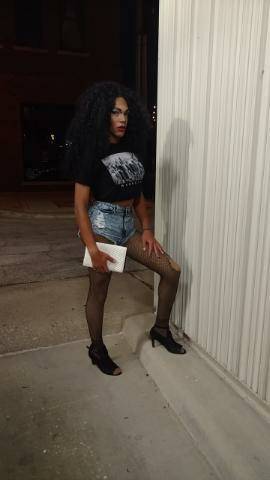 Brown, who is 19 and a C-U “townie”, disagrees. “I do not know Ed personally, but I cannot agree with him on the idea that queer individuals are welcome everywhere. C-Street set an extremely high standard of what a (LGBTQ) bar can and should look and feel like. After turning 19, I participated in the townie tradition of bar crawling for my birthday. As I walked through the streets of downtown and the U of I campus, I quickly realized that no other bar in town comes remotely close to that standard.”
Brown, who is 19 and a C-U “townie”, disagrees. “I do not know Ed personally, but I cannot agree with him on the idea that queer individuals are welcome everywhere. C-Street set an extremely high standard of what a (LGBTQ) bar can and should look and feel like. After turning 19, I participated in the townie tradition of bar crawling for my birthday. As I walked through the streets of downtown and the U of I campus, I quickly realized that no other bar in town comes remotely close to that standard.”
Brown shared anecdote after anecdote about different local bars where the door man refused his ID, claiming “it didn’t look like me because I was wearing makeup in person and not in the ID picture,” and even being asked by a doorman at one well-known local bar if he was “seriously going to come in dressed as a fairy.” Brown says it isn’t just the doormen. “The patrons are far worse than the staff,” says Brown, sharing details about a group of men who refused to let him into a bathroom because they “would not piss with a fag in the room.” Brown’s bad experiences were not just in campus bars, but in downtown Champaign bars as well. “The looks of disgust are never ending, and often crush my desire to go out. Chester Street Bar was not perfect, but it was always welcoming. It was more than a place to drink and dance, it was a place to mourn the tragedies of our community, a place to inspire culture, and a home to many that did not have their own.”
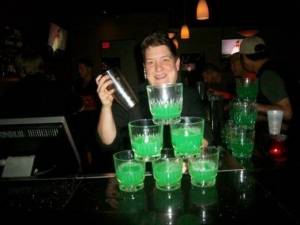 Myers is passionate about the need for LGBTQ space in C-U. “We still need inclusive spaces, places to hold our partner’s hands and share pride. We have marriage equality but that is just the beginning, there is so much more we need to fight for. When I go to any other local bar with drag queens after a show, there is pointing and laughing, this is still real here in C-U, today. We need (LGBTQ) community and spaces as much as ever.” Myers has put her passion into action and has launched “Prideful Sundays” at 51 Main where she is producing drag shows with top name guest acts like RuPaul Drag Race contestants and national drag title holders.
Myers is passionate about the need for LGBTQ space in C-U. “We still need inclusive spaces, places to hold our partner’s hands and share pride. We have marriage equality but that is just the beginning, there is so much more we need to fight for. When I go to any other local bar with drag queens after a show, there is pointing and laughing, this is still real here in C-U, today. We need (LGBTQ) community and spaces as much as ever.” Myers has put her passion into action and has launched “Prideful Sundays” at 51 Main where she is producing drag shows with top name guest acts like RuPaul Drag Race contestants and national drag title holders.
When asked about his thoughts on the future of LGBTQ inclusive spaces in C-U, Wallace was more philosophical. “Well, it’s going to evolve,” he answered. “That’s what always happens. We’ll find our places, we always do, we’ll know where we are welcomed and our friends are welcomed. These things change, but we always find our spots.”
When asked what his thoughts are about the sale of C-Street and it’s uncertain future, McNamara pauses for a moment. “The Bar and C-Street together we’re open almost 40 years, that’s monumental. That touched a whole lot of lives. The fact that a gay bar lasted that long, had that kind of staying power in one community, I’d say that’s quite something, wouldn’t you?”
Editor’s Note: The bar Chances R was originally written as “Chances Are” and corrected.








